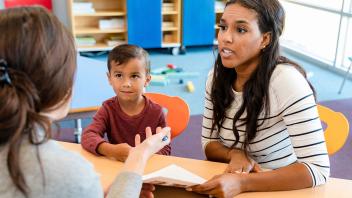(This article is from the ColorinColorado.org web site and is also available in Spanish. The links in the article below will take you to articles on ColorinColorado.org.)
- Meet your child’s teacher
As soon as the school year starts, find a way to meet your child’s teacher. Let the teacher know you want to help your child learn. Make it clear that if the teacher sees a problem developing, you want to hear about it immediately.
If you’re not comfortable speaking in English, ask the school to find someone who can interpret for you. There may be a teacher or parent liaison who can help. Or you can bring a bilingual friend or relative with you.
- Attend parent-teacher conferences
Schools usually have one or two parent-teacher conferences each year. Talk to your child beforehand to see if there’s anything he or she wants you to discuss with the teacher. When you meet with the teacher, bring a list of your questions or concerns.
This is also a good time to hear what the teacher has noticed. The teacher might know why your child doesn’t like class, for example, or might have advice on how you can help your child learn at home. Talking with the teacher gives both of you a chance to share information and work together for the good of your child.
You don’t have to wait for parent-teacher conferences to talk to your child’s teacher. You can ask to meet with your child’s teacher at any time during the year. If you have a concern and can’t meet face-to-face, send the teacher a short note or set up a time to talk on the phone.
- Ask questions
If something concerns you about your child’s learning or behavior, ask the teacher or principal about it and seek their advice. Your questions may be like these ? What specific problem is my child having with reading? What can I do to help my child with this problem? How can I stop that bully from picking on my son? How can I get my child to do homework? Which reading group is my child in?
- Find out how your child is doing compared to other students
Ask the teacher how well your child is doing in class compared to other students. If your child is not keeping up, especially when it comes to reading, ask what you or the school can do to help. It’s important to act early before your child gets too far behind. For more information, see the page called How to know when your child needs extra help.
- Join your school’s parent-teacher group
At most schools, a group of parents meets regularly to talk about the school. This group is usually called the PTA or PTO. The meetings give you a good chance to talk with other parents and to work together to improve the school.
- Help out at your child’s school
Teachers appreciate it when parents help out at the school! There are many ways you can contribute. You can volunteer in your child’s class or in the school library. You can make food for a school event. If you work during the day and it’s hard to get to school during the day, you can attend “family night” activities at the school or your child’s performances.
- Make sure your child does homework
Ask your child each day what he or she did at school. Make sure your child studies and finishes assignments. Read your child’s report cards.
- Find homework help for your child
If it is difficult for you to help your child with homework or school projects, see if you can find someone else who can help. Contact the school, tutoring groups, after school programs, churches, and libraries. Or see if an older student, neighbor, or friend can help.
- Learn what the school offers
Read the information the school sends home (ask to receive the information in another language if you’re not comfortable reading in English). Talk to other parents to find out what programs the school offers. Maybe there’s a music program, after-school activity, sports team, or tutoring program your child would enjoy.
- Apply for special services if you think your child may need it
If your child is having problems with learning, ask the school to evaluate your child in his or her strongest language. The teacher might be able to provide “accommodations” for your child in class. If the school finds out your child has a learning disability, he or she can receive extra help at no cost. For more information, see the page called Where to go for help.
